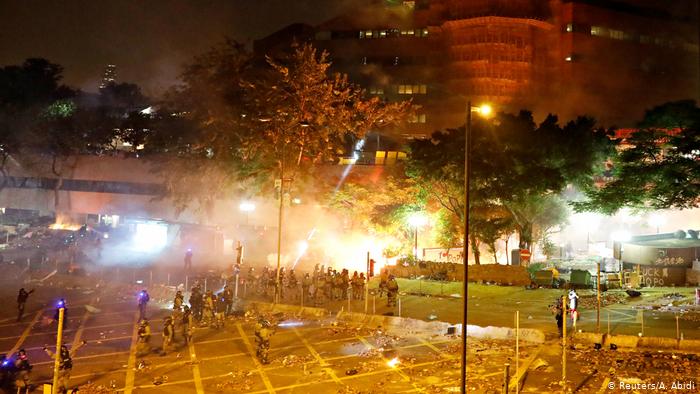
Hong Kong police on Monday swooped into a major university campus with tear gas and batons where hundreds of protesters were trapped inside after police sealed off roads around the area.
Fiery explosions could be seen inside Hong Kong's Polytechnic University as riot officers stormed into the building before dawn after both sides refused to back down.
Police had created a cordon around the university to prevent the anti-government protesters from escaping as they moved in.
'Afraid to leave campus'
"This is without a doubt the most highly charged 24 hours of this five-month protest movement so far," reported DW's Charlotte Chelsom-Pill outside university where the standoff was ongoing.
"Protesters have been told to leave the campus area. As they attempted to run past police, they were met by tear gas and arrest. We're seeing images of protesters being tackled to the ground, some of them dragged across the floor during that arrest."
Police have declared the campus a "riot" scene. In Hong Kong "rioting" is punishable by up to 10 years in jail.
Some protesters told DW they were too afraid to leave the university.
Around 200 protesters were believed to be trapped inside the building. Most are understood to be students.
Live bullets
Police fired tear gas volleys at the protesters to drive them back, many of whom climbed over a fence and headed back inside the university.
Police spokesman Louis Lau issued a warning suggesting that a more proactive use of live rounds may be necessary in the face of rioters' use of petrol bombs and arrows.
"If they continue such dangerous actions, we would have no choice but to use the minimum force necessary, including live rounds, to fire back," Lau said.
The editor-in-chief of China's Global Times tabloid on Sunday said Hong Kong police should use snipers to fire live ammunition at violent protesters.
"If the rioters are killed, the police should not have to bear legal responsibility,'' Hu Xijin posted on his Weibo social media, reported the Associated Press. He made similar comments on Twitter.
Flashmob protest
DW reporter Mathias Bölinger reported office workers in Hong Kong's central business district staged a lunchtime protest alongside radical protesters on Monday. The office workers apparently did not agree with an assessment by Carrie Lam that protesters paralysing the city were selfish and were now "the enemy of the people."
Tension escalates
Tension between police and demonstrators escalated after a media liaison officer was struck in the leg with an arrow earlier that day.
Police repeatedly attempted to break into the university and, after protesters refused to give in to an ultimatum to come out and surrender, fired tear gas and water cannons at activists outside the campus just before midnight.
The pro-democracy protesters had barricaded themselves inside the university for days, retaliating with gasoline bombs and bows and arrows. They had also assembled an arsenal of petrol bombs in an attempt to resist police.
Earlier, protesters set fires on bridges leading to the university as they tried to stop police from advancing in on their campus. They also shut down access to a major road tunnel under Hong Kong's harbor for several days.
Some protesters remained outside the university to deter police advancement. Many in the crowd wore raincoats and carried umbrellas to shield themselves.
The protesters had held fort all day Sunday near an intersection outside the university campus as police fired tear gas and water cannons at them.
The protests were triggered months ago by a proposed law allowing for the extradition of criminal suspects to mainland China. Although the bill was ultimately dropped, the protests have expanded into a wider resistance movement demanding full democracy.
The legislation was seen by many in Hong Kong as an attempt by Beijing to erode the autonomy guaranteed when Britain handed the territory over to China in 1997.